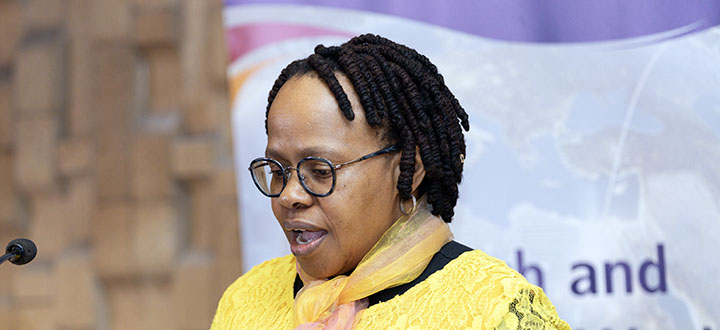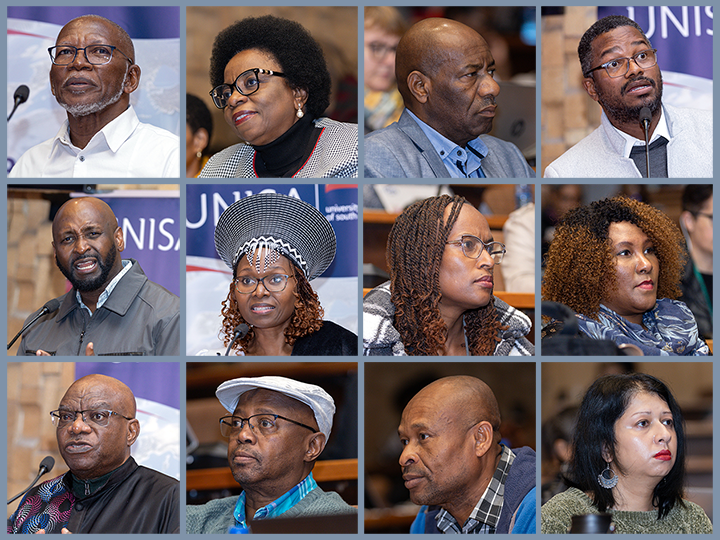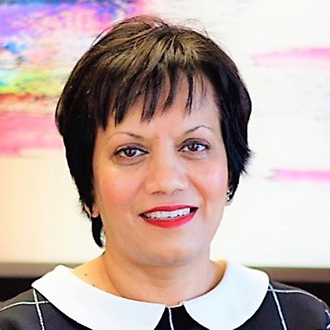News & Events
Artificial intelligence as an academic collaborator and challenger

Prof Thenjiwe Meyiwa, Vice-Principal: Research, Postgraduate Studies, Innovation and Commercialisation
Unisa recently kickstarted its highly anticipated Research and Innovation Week, running from 19 to 23 May 2025 at the Muckleneuk and Science Campuses. Themed Proudly African and globally relevant, this year’s Research and Innovation Week seeks to address the unique challenges faced by the African continent, while contributing valuable insights to the broader global community. It is grounded in the rich cultural, historical and socio-economic contexts of the continent, focusing on locally appropriate and universally applicable solutions, from sustainable agriculture and healthcare innovations to climate resilience and digital transformation.

Unisa’s academics in session at the opening of the 2025 Research and Innovation week.
Rerouting and rebuilding African languages and pedagogies
Professor Thenjiwe Meyiwa, Vice-Principal: Research, Postgraduate Studies, Innovation and Commercialisation, said that this year’s theme is very much connected to the mission and vision of Unisa, as a university that produces research that is responsible and responsive, while reaffirming the value of Africa’s knowledge systems. “This knowledge must be democratised and globalised,” she emphasised.
Continuing on the theme, Meyiwa said that research knowledge needs to be locally meaningful, boost the university’s catalytic niche areas, and align with the African Union’s Agenda 2063 and the United Nations’ Sustainable Development Goals. “This theme calls for us to rebuild and reroute our African languages and pedagogies in a manner that reflects Africanness,” she added.
Concluding her message, Meyiwa stressed that as an African university, “we need tailor-made innovations and solutions that prioritise local contexts, which make us socially knowledgeable and invigorates us to imagine and create our own technologies, without having to rely on the West.”
Rewriting the rules
Speaking next in her highly anticipated virtual keynote address was Professor Nyna Amin, Interim Director: Teaching and Learning Portfolio, University of KwaZulu-Natal. Her riveting address was themed Rewriting the rules: artificial intelligence as academic collaborator and challenger.
Amin began by asking the audience how as Africans we can create our own large language models, explaining that for a machine to learn to produce African artificial intelligence (AI) generated content, that there needs to be a huge volume of written texts in South Africa’s indigenous languages, which, she said “we do not have at the present moment. We have been largely publishing in English, which is now the dominant language.”

Prof Nyna Amin, Interim Director: Teaching and Learning Portfolio, University of KwaZulu-Natal
Amin said that there are major developments in technologies powered by AI, taking place every day, that we can barely keep up with, and that choosing the right AI-assistance tool can be quite a challenge. In addition, Amin advised the audience to find the long-standing academic protocols that were developed for an intellectual ecosystem that was mainly human-centred and investigate whether these protocols are still relevant in an environment that incorporates AI, adding: “The environment is changing rapidly and certainly the way we do research will somehow also be interrupted and disrupted.”
Amin said that to accommodate new knowledge production that integrates humans and AI, it is necessary to rebuild the frameworks of the adamic infrastructure with careful consideration to maximise the advantages of AI and human cooperation.
“As workers in higher education,” continued Amin, “we have limitations. However, AI is a powerful tool and a fabulous collaborator when used ethically. The scientific methods, peer reviews, and double-blind experimentations – these pillars of academic rigour were designed with human researchers in mind, and more importantly, designed for human limitations. Yet AI is increasingly participating in this process. Therefore, we have to ask ourselves about these emerging new forms of knowledge production and whether our current frameworks can adequately evaluate and incorporate them. Take, for example, students who submit AI-generated assignments – do our current frameworks adequately accommodate this?“ asked Amin.
Perennial problem in academia
“At the heart of uses of AI in higher education,” said Amin, “is that we are very much aware of students plagiarising, copying from one another, or getting someone to write on their behalf, and this has been a perennial problem in academia. Now, AI has brought this to the forefront. Therefore, we have to find ways to deal with this problem. And as we are gradually moving away from content generation, we should not be asking students to write essays, because they are simply going to reproduce what ChatGPT, for example, generates for them,” cautioned Amin.
Re-questioning the established norms
Amin continued challenging the established practices in higher education, citing the example of Italian astronomer Galileo Galilei, who broke myths about astronomical observation and dared to suggest that the Earth was not the centre of the universe. When facing death, he had to declare that the Earth was the centre of the universe while in motion. “This stance is among the most succinct defences of empirical evidence over established authority,” said Amin. “So, there is always established authority, and at the moment it is based on how we write, how we publish our authenticity and originality. How can these boundaries be shifted and moved to accommodate AI? Albert Einstein’s theory of relativity challenged Isaac Newton’s laws of motion and gravity by questioning the absoluteness of time and space. And we, therefore, have to challenge the absoluteness of the ways in which we write, do research, and publish.”
Flawless output results
Delving deeper into the theme, Amin said that generative AI produces perfect results, especially in writing content. She added: “While working with AI, I found that its ideas are the best, that I cannot rewrite or do better than it. The problem is that while it is not logic-perfect, the results it produces are word-perfect. It flows like poetry. But on closer inspection, you will find that it is content and context bias, devoid of emotions and personality. Everyone who uses AI writing can quickly notice machine-generated content.”
Acknowledging the use of AI
Concluding her message, Amin explained that she finds AI useful for administrative tasks and literature review and cautioned that it should not be used as a tool to outsource and replace genuine thinking and intellectual thought. “When writing a paper, you can use AI to find the literature, but how you conceptualise it and think about your arguments is work that you should do as the author,” she explained. “And if you have used AI, you must acknowledge it; not doing so comes across as dishonest and a breach of intellectual integrity, which undermines your work,” she added.
Following Amin’s intriguing address, the university’s academics interacted and deliberated on the significance of research driven by AI, Africa incorporating AI in academia, and the university’s highly specialised catalytic niche areas.
The 2025 Unisa Research and Innovation Week will provide the ideal platform for discussions on Africa-driven, globally relevant research in order to foster innovation, stimulate economic growth, and address the continent’s societal challenges.
* By Godfrey Madibane, Acting Journalist, Department of Institutional Advancement
** Photography by Mduduzi Khathamzi, Multimedia Centre
Publish date: 2025-05-20 00:00:00.0

